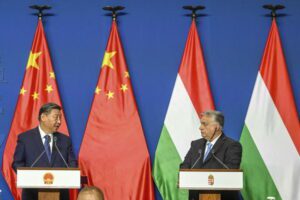Hungary’s Viktor Orban Met China’s Xi Jinping on ‘Peace Mission 3.0’ in Beijing on Monday. This visit, dubbed “Peace Mission 3.0” by Orban, follows his recent trips to Moscow and Kyiv. It precedes the NATO summit marking its 75th anniversary, where discussions will likely focus on setbacks in Ukraine.
Context of the Visit

Orban’s visit to Beijing follows his unexpected trips to Russia and Ukraine. On Friday, Orban, known for his friendly stance towards Moscow among EU leaders, discussed the war in Ukraine with President Vladimir Putin. This meeting drew criticism from both Kyiv and the EU, who argued it undermined the EU’s unified position on the conflict.
Hungary assumed the European Union’s rotating presidency at the start of July. The EU’s foreign policy chief, Josep Borrell, noted that Orban’s trip to Russia was a bilateral affair and that he had “not received any mandate from the EU Council to visit Moscow.”
Meeting with Xi Jinping

In Beijing, Orban is expected to engage in “in-depth communication on issues of mutual interest” with Xi Jinping, according to a statement from the Chinese foreign ministry. Orban, who maintains close ties with both Xi and the Kremlin, has refrained from sending weapons to Kyiv, setting him apart from many EU leaders.
China and Russia’s strategic partnership has strengthened since the invasion of Ukraine. While Beijing claims neutrality in the conflict, it has provided substantial economic support to Russia, with trade between the two nations increasing significantly since the war began.
Key Topics and Reactions
What are the potential implications of strengthened China-Hungary ties?
Closer China-Hungary relations could alter economic dynamics within the EU, as Hungary’s approach diverges from the broader EU trend of reducing reliance on China. This could lead to tensions within the EU, which aims for a unified economic strategy regarding China.
How did the European Union and Kyiv react to Orban’s visit to Moscow?
Orban’s trip to Moscow and his stance on the Ukraine conflict faced criticism from both EU allies and Kyiv. EU officials argued that the visit undermined the EU’s unified position on Ukraine, while Kyiv expressed disappointment, seeing the meeting with Putin as contrary to EU efforts.
What were the key destinations of Viktor Orban’s ‘peace mission’ visits?
Viktor Orban’s ‘peace mission’ included trips to Ukraine, Russia, and China. These visits aim to facilitate dialogue amid the ongoing conflict in Ukraine and have garnered significant international attention.
What is the broader geopolitical context of Viktor Orban’s visits to Russia and China, and how do these visits fit into Hungary’s broader foreign policy goals?
Amid heightened geopolitical tensions, particularly regarding the Ukraine conflict, Orban’s visits to Russia and China reflect Hungary’s foreign policy goals of promoting peace and stability while maintaining good relations with both nations.
What was the purpose of Viktor Orban’s ‘peace mission’ during his visit to Beijing, and how does it align with Hungary’s current role within the EU?
Orban’s ‘peace mission’ in Beijing aimed to promote regional peace and stability, especially concerning the Ukraine conflict. This aligns with Hungary’s role as the holder of the EU’s rotating presidency, seeking to balance good relations with China and Russia while addressing the concerns of other EU members.
Economic Relations
Hungary has attracted significant Chinese investment, particularly in battery and electric vehicle (EV) manufacturing. The Hungarian government reports around 15 billion euros ($16 billion) worth of ongoing projects from China. Since returning to power in 2010, Orban has promoted an “Eastern opening” foreign policy, fostering closer economic ties with China, Russia, and other Asian countries.
In May, Xi Jinping visited Hungary, emphasizing the importance of EU relations. Despite its small size, Hungary’s strategic position and economic initiatives make it a critical player in EU-China relations.
Orban’s meeting with Xi Jinping highlights Hungary’s strategic foreign policy, balancing EU commitments with closer ties to major global powers like China and Russia. As Hungary navigates its role within the EU and on the global stage, the outcomes of these high-profile visits will likely influence the broader geopolitical landscape.
Related news:
China’s Xi Jinping begins first Europe tour in 5 years in France
China and EU Forge Strong Economic Ties in Candid Talks
NATO at 75: Emerging Trends in Cyber-Security Infrastructure
















